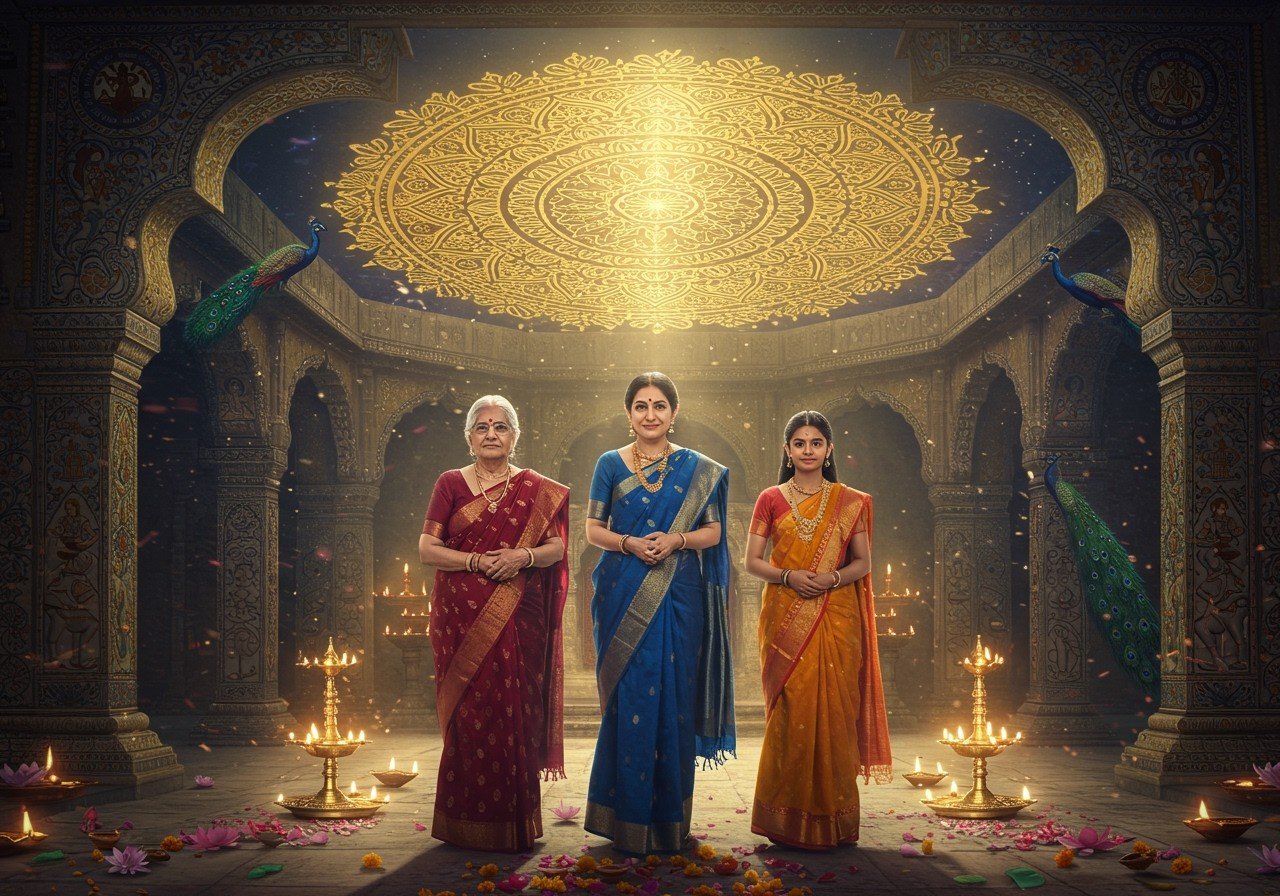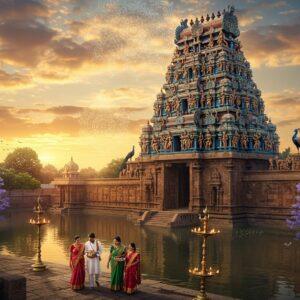
In Indian tradition, the shloka ‘Yatra Naryastu Pujyante‘ holds a significant place. Translated as ‘Where women are honored, there the gods rejoice,’ this ancient verse from the Manusmriti highlights the respect for women in our culture. By exploring its historical roots and understanding its relevance today, we can see how it encourages gender equality. This shloka continues to influence our cultural norms and practices.
Understanding the Shloka – ‘Yatra Naryastu Pujyante Ramante Tatra Devata’
Breaking Down the Shloka:
- Yatra: Where
- Naryastu: Women
- Pujyante: Are honored/worshipped
- Ramante: reside/rejoice
- Tatra Devata: There the gods/ divinity
This simple yet profound statement suggests that honoring women is akin to honoring the divine. The Sanskrit phrase “यत्र नार्यस्तु पूज्यन्ते रमन्ते तत्र देवता” (yatra naryastu pujyante ramante tatra devata) translates to: “Where women are honored, divinity blossoms there“. Another interpretation states, “Wherever women are given their due respect, even the deities like to reside there, and where they are not respected, all actions remain unfruitful“. In ancient India, this perspective elevated the status of women, showcasing their importance in society. It reflects a cultural belief that where women are respected, prosperity and happiness follow. This phrase emphasizes the importance of treating women with dignity and respect, suggesting that when women are honored, divinity prevails and shines. Conversely, when women are dishonored, efforts and actions are fruitless. It suggests that societies that respect women and give them their rights are more likely to prosper, while those that subject women to injustice remain backward.
Historical Context and Origins
The shloka originates from the Manusmriti, an ancient Hindu text that shaped societal norms. The Manusmriti emphasized women’s roles in family and society. During its time, the shloka reinforced the values of respect and reverence for women. These values continue to resonate even in today’s society, highlighting women’s pivotal roles. You can learn more about these pivotal roles and rituals in our other blog post :Understanding the Science Behind Puja for Holistic Well-being .
Significance in Modern Society
Today, ‘Yatra Naryastu Pujyante‘ aligns with gender equality movements. It reminds us of the importance of respecting women, a message that is crucial in modern times. This shloka is often referenced in discussions about women’s rights, showing its timeless relevance. Applying this wisdom can help address current gender disparity challenges. For deeper insights into aligning your rituals with celestial influences, explore our blog post: Aligning Your Puja with Celestial Energies for Maximum Benefit.
Cultural Interpretations and Practices
Different regions in India interpret this shloka uniquely. Rituals, festivals, and daily practices reflect its philosophy. Such cultural expressions preserve the shloka’s message across generations. Matriarchal societies within India embody this spirit, showing the respect and honor given to women. Seeking harmony and success? Dive into our Navagraha Puja guide: Seeking Harmony and Prosperity: A Guide to Navagraha Puja .
Yatra Naryastu Pujyante in Literature and Art
This shloka influences literature and art significantly. Poets and artists use this theme to express women’s sanctity and power. Classical literature and contemporary art draw inspiration from it. Mythology and storytelling also reinforce its teachings, spreading its message further. For a deeper understanding of birth charts and their significance, refer to our blog post: Understanding the Role of Birth Charts in Pooja Practices.
Challenges and Misinterpretations
Sometimes, the shloka’s intent might be misunderstood. In some contexts, interpretations might not align with its original message. Misinterpretations could lead to neglecting women’s rights or misusing cultural values. Understanding the context of the Manusmriti is crucial to prevent these issues. Balancing traditional wisdom with modern perspectives ensures respect for women remains central. Delve into the power of the Gayatri Mantra with our insightful blog: Unlock the Power of the Gayatri Mantra for Spiritual Growth.
How Poojn.in Supports Your Divine Feminine Worship
At Poojn.in, we offer essential items to help you honor the divine feminine energy celebrated in the Yatra Naryastu Pujyante shloka. Our authentic puja items support worship of powerful goddesses like:
- Maa Durga: Find complete puja thalis, sindoor, and red bangles for Durga worship. Consider this beautiful brass Radha Krishna Murti for your altar.
- Maa Lakshmi: Access pure copper coins, lotus-shaped diyas, and special Lakshmi yantra. Enhance your Lakshmi puja with this exquisite brass Maa Tara Murti.
- Maa Saraswati: Shop for white flowers, books for sacred texts, and veena-shaped items. You might also appreciate this brass Laddu Gopal Murti.
We provide carefully selected ritual items that maintain the sanctity of traditional goddess worship while offering modern convenience through:
- Quality-checked authentic materials
- Detailed product descriptions with ritual significance
- Safe packaging of sacred items
- Pan-India delivery
- Expert guidance on proper usage
Visit www.poojn.in to explore our complete range of goddess worship items. Our products help you maintain the sacred traditions of feminine divinity worship with convenience and authenticity.
Note: Product availability may vary. Please check website for current stock.
Conclusion: Embracing the Wisdom of ‘Yatra Naryastu Pujyante’
The shloka ‘Yatra Naryastu Pujyante‘ is more than just words; it is a guiding principle in our culture. Its message of honoring women is timeless, encouraging us to build a society where respect and equality prevail. By embracing this wisdom, we acknowledge the vital role women play in nurturing families and communities. This verse inspires us to reflect on our values and practices, ensuring they align with the respect women deserve. As we continue to celebrate and uphold these teachings, we move toward a future where the divine truly rejoices.


